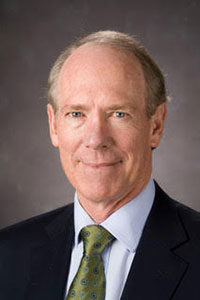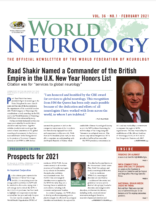By William M. Carroll, president of the World Federation of Neurology
An Important Conjunction

William Carroll, MD
As this column goes to press in the first issue of World Neurology for 2021, it is surprising to see the energy and the activities the WFN will be involved in after such a trying 2020. I will enlarge on the role of the WFN in the COVID-19 pandemic, but first I wish to highlight two important events that occurred late last year and early this year.
The first was the adoption by the World Health Organization (WHO) of resolution WHA 73.10. As was communicated to all member societies in November and again in my column in December, this particular resolution was a landmark event. For the first time, neurological disorders were recognized by the WHO for what they are: a looming threat to individuals and societies, including both economic and personal burdens.
In common language, the WHO plans to develop an all-encompassing action plan to mitigate the effects of neurological disorders on brain health throughout life. This plan has become known as the Intersectoral Global Action Plan (IGAP) for epilepsy and similar neurological disorders.
Early in resolution WHA73.10, neurological disorders are described as “conditions of the central and peripheral nervous system that include epilepsy, headache disorders, neurodegenerative disorders, cerebrovascular diseases, including stroke, neuroinfectious/neuroimmunological disorders, neurodevelopmental disorders and traumatic brain and spinal cord injuries.” Subsequently, these disorders do occur as comorbidities of epilepsy and that many may benefit from similar public health measures to be developed for epilepsy.
Since this development, the WFN has been engaged with the International League Against Epilepsy, the International Bureau for Epilepsy, and the International Child Neurology Association in preparing the broader neurological fraternity, including members of the Global Neurology Alliance to be ready to contribute to the proposed plans if requested by the WHO.
The second important event has been the launch of the WFN Brain Health Initiative (BHI). The BHI arose through the perceived need to promote brain health more generally and more widely. This ambitious initiative is aimed at the global population and not just the WFN and its specialty constituents. Many members of the Global Neurology Alliance (GNA) have their own educational advocacy programs. Indeed, the WFN does this also through its biennial WCN and the annual disease specific World Brain Day (WBD), lately always partnered with a GNA member.
In this initial phase, the BHI will comprise five separate but sequential modules. The first two, titled “An Introduction to Brain Health” and “What Happens When Brains Are Not Healthy” were launched on Jan. 11 and the parallel webinar Feb. 17. The webinar also included contributions from each of the WFN regional organizations.
Modules 3 to 5 will follow soon with a launch webinar that will hopefully feature a wider collaboration from member societies.
The reason for highlighting the fortunate conjunction of these two crucial events is that there is an evolving momentum on the importance of brain health. Triggered in part by the Global Burden of Disease (GBD) study of 2016 showing neurological non-communicable disorders (nNCD) are the leading cause of disability and the second leading cause of death, a growing number of organizations and people are recognizing that brain health is not only a natural gift but that for some its attainment requires active, effortful participation as does the maintenance of optimum brain health.
It is hoped that along with improvement in health standards generally there will be increasing emphasis on the importance of brain health. People, societies, health care practitioners and governments need to advocate in concert for measures that reduce the risk of brain ill-health and injury.
Brain Health Initiative and COVID-19
From the above, it is clear that the WFN will be focusing its virtual efforts on brain health including the Brain Health Initiative.
It is opportune to compare the preparations for this challenge with that which the world has had to undertake for the challenge of COVID-19. Although over a much shorter time frame, the world has begun to introduce a viable response to the pandemic. With the same energy and commitment, the world will meet the challenge of the increasing burden of neurological disorders.
Through 2020, the WFN has participated with two groups developing means to capture, measure, and treat any neurological state generated by the COVID-19 pandemic.
Both the WHO Global Forum on Neuro-COVID-19, headed by Tarun Dua (WHO Brain Health Unit) and the Neuro Covid-19 Coalition inaugurated by Andrea Winkler (University of Munich), have worked in parallel to assess the acute effects and the late effects of COVID-19 infection.
The development of the WHO Global COVID-19 Clinical Case Record Form (CRF) provides a uniform CRF that can be employed in the acute and importantly the post-infective stage of COVID-19 illness and will ensure as far as possible that the data collected from anywhere will be viable and informative. Thanks go to Richard Stark and Alla Guekht for their efforts on our behalf with these groups. It is envisaged that the WFN will continue to be associated with these two groups through 2021.
World Brain Day
Following on from the successful collaborations with the International Headache Society in 2019 and the International Parkinsons Disease and Movement Disorders Society through the peak of the pandemic in 2020, the WFN will likely partner with the Multiple Sclerosis International Federation in 2021.
The WFN decision on this topic was made only after careful consideration. Multiple sclerosis (MS) and other immune-mediated CNS inflammatory disorders have an important success story to disseminate, share a link with severe and often fatal COVID-19 disease, have caused concern among those with MS with regard to treatments and COVID-19 vaccination and highlight again the risk the pandemic poses to ongoing neurological management through the diversion of resources.
The success story for MS is that with the continuing development of effective therapies and the post-marketing observations, it has become evident that the accrual of disability from MS has been dramatically reduced and even more so if treatment is begun early. Furthermore, there are now therapies arriving that promise to slow the later, progressive phase of MS.
Communication
Thanks to the efforts of member societies and the London office staff of the WFN, we now have the ability to communicate rapidly and with high fidelity. Efforts now will be centered on maintaining this facility as is it clearly to the benefit of us all. Thanks also to those who maintain the WFN website, a never-ending task. The recent update of the homepage to accommodate the Brain Health Initiative is a case in point.
Needs Registry
Another crucial example of the benefits of reliable communications is the completion of the Needs Registry survey by some 115 of the 122 member societies. The data is now undergoing preliminary statistical evaluation, and it is hoped that this will be able to be shared with members soon. It is likely that the Needs Registry survey data will also be helpful for the IGAP.
World Congress of Neurology and Council of Delegates Meeting
Planning and organization of the 25th WCN will be a major effort through this year. Ryuji Kaji, chair of the WCN Congress Committee, reports on the progress of this WCN in this issue. At this time, it appears quite unlikely that this congress will be a wholly physical or face-to-face meeting. Kenes, the WFN professional conference organizer (PCO), has experience and expertise to hold a hybrid meeting or a totally virtual meeting, whatever eventuates. The WFN, the Society of Italian Neurologists and Kenes hope to hold off a final decision on the format of the WCN until April, some six months before the WCN. Given the uncertainties about the pandemic and the likelihood of a hybrid meeting, the trustees have determined to again conduct the scheduled elections electronically as was done successfully in 2020. In this regard, I draw your attention to the notice of elections and the call for nominations for those elections. •
